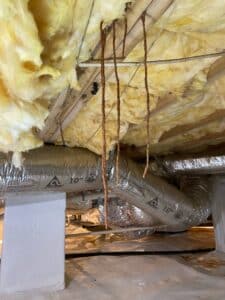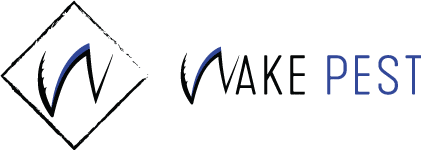Termites are often called the “silent destroyers” for a good reason. These tiny pests can stealthily infiltrate your home, causing extensive damage before you even realize they’re there. For homeowners in Wake Forest, NC, staying vigilant against termites is particularly important. The local climate, with its warm summers and mild winters, provides an ideal environment for termites to thrive.
As a leading pest control agency, we understand the challenges homeowners face in keeping their properties termite-free.
Understanding Termites
Termites might be small, but their impact on your home can be huge. To effectively protect your property from these pests, it’s essential to understand what termites are, their life cycle, and why they are attracted to homes in Wake Forest, NC.
What Are Termites?
Termites are social insects that feed on cellulose, the main component of wood. Despite their small size, termites work collectively in large colonies that can cause extensive damage to wooden structures over time. They are often mistaken for ants, but unlike ants, termites have straight antennae, a uniform waist, and wings of equal size when they have them.
The Termite Life Cycle
The life cycle of a termite begins with the swarming of winged adults, known as alates, from their colony to start new colonies. After mating, these winged termites shed their wings and become the king and queen of their new colony. The queen lays eggs, which hatch into nymphs. These nymphs then differentiate into workers, soldiers, or reproductive termites, depending on the colony’s needs. This life cycle allows termite colonies to grow rapidly and can lead to significant damage if not addressed promptly.
Climate Impact on Termite Activity
The climate in Wake Forest, NC, with its warm summers and relatively high humidity, provides an ideal environment for termites, particularly the subterranean species. These termites require moisture to survive and are drawn to homes that offer easy access to wood and water. The mild winters in the area allow termites to remain active year-round, increasing the risk of infestation.
Common Types of Termites in North Carolina
- Subterranean Termites: The most common and destructive type in North Carolina. These termites build mud tubes to travel between their underground colonies and food sources, making homes with wood in contact with soil or with moisture problems particularly vulnerable.
- Drywood Termites: Less common in North Carolina but still a concern, drywood termites infest dry wood directly and do not require contact with the soil. They can be introduced to homes through infested furniture or lumber.
Understanding these aspects of termites is the first step in protecting your home. Knowing what attracts termites and how they operate allows homeowners to take proactive measures to minimize the risk of infestation.
Early Signs of Termite Infestation
Identifying a termite infestation early can save you from the headache of extensive and costly damage. Termites are discreet pests, but they leave behind telltale signs that can alert homeowners to their presence. Here are key indicators to watch for in your home:
Mud Tubes on Exterior Walls

Hollow-Sounding Wood
Termites consume wood from the inside out, leaving a thin veneer of timber or paint. When you tap on areas where termites have been eating away, the wood will sound hollow or papery due to parts of it being eaten away. This sign often goes unnoticed until significant damage has been done, so regular inspections are crucial.
Discarded Wings Near Doors or Windows
After swarming, termite alates shed their wings. Finding piles of discarded wings inside your home, especially near doors, windows, and other entry points, can indicate that termites are attempting to establish a new colony nearby. This usually occurs in the spring but can vary depending on the climate.
Frass (Termite Droppings)
Drywood termites produce wood-colored droppings known as frass as they eat through infested wood. If you notice small, pellet-like droppings near wooden structures, it’s a strong indication of a drywood termite infestation. Unlike subterranean termites, drywood termites do not use mud tubes, making frass one of the few visible signs of their presence.
Recognizing these early signs of termite activity is crucial in preventing a minor issue from becoming a major infestation. Regular inspections by our technicians can help you catch these signs early.
Preventative Measures
Keeping termites at bay involves a combination of moisture control, wood management, and yard maintenance. By making your home less attractive to termites, you can significantly reduce the risk of infestation.
Moisture Control
Termites are attracted to moisture, so reducing excess moisture around your home is crucial.
- Fix Leaks Immediately: Regularly check for and repair leaks in your roof, pipes, and HVAC systems. Even a small drip can create a moist environment that attracts termites.
- Ensure Proper Drainage: Make sure your gutters and downspouts are clear and direct water away from your home’s foundation. Consider installing splash blocks or French drains if necessary.
- Use Dehumidifiers: Basements and crawl spaces can be particularly prone to dampness. Use dehumidifiers to keep these areas dry and less appealing to termites.
Wood Management
Since termites feed on wood, managing wood and cellulose materials around your home is vital.
- Store Firewood Away from the House: Keep firewood, lumber, and paper at least 20 feet away from your home and elevated off the ground to avoid attracting termites.
- Inspect Decks and Fences: Regularly check decks, fences, and other outdoor wooden structures for signs of termite damage and repair any issues promptly.
- Treat Wood in Contact with the Ground: Wood that touches the soil is especially vulnerable to termites. Use treated wood for outdoor construction and consider applying termite-repellent products to existing structures.
Landscaping and Yard Maintenance
The way you maintain your yard can influence your home’s susceptibility to termites.
- Maintain a Gap Between Soil and Wood Portions of the Building: Ensure there is at least an 18-inch gap between soil and any wood parts of your home. This gap can deter termites and make it easier to spot signs of activity.
- Trim Back Trees and Bushes: Overgrown vegetation can trap moisture and create shaded areas that termites find inviting. Keep landscaping trimmed and away from your home’s exterior.
- Use Mulch Sparingly: Mulch can retain moisture and attract termites. If you use mulch in your garden, apply it sparingly and keep it at least 15 inches away from your home’s foundation. Consider using termite-resistant mulch or alternative ground coverings like gravel.
By incorporating these preventative measures into your home maintenance routine, you can create a less inviting environment for termites.
Professional Prevention and Treatment Options
While DIY efforts play a crucial role in termite prevention, partnering with a professional pest control service offers an added layer of protection and peace of mind. Pest control experts have the knowledge, tools, and experience necessary to effectively prevent and treat termite infestations.
The Role of Professional Pest Control from Wake Pest
We employ trained technicians who can conduct thorough inspections, identify potential risk factors for termite infestations, and recommend customized solutions. Our termite control team can spot signs of termite activity that might be overlooked by the untrained eye, ensuring early detection and treatment.
Termite Prevention Treatments
We offer several preventative treatments to protect homes from termites:
- Soil Treatments: These involve applying termiticide to the soil around and under the foundation of your home to create a barrier that kills termites as they attempt to enter.
- Wood Treatments: Applying termiticides directly to wood surfaces, injections into infested areas, and the use of treated wood in construction can deter termites and eliminate colonies.
- Bait Systems: Termite bait stations are placed around the perimeter of your home to monitor termite activity. Once termites feed on the bait, they carry the poison back to their colony, effectively reducing the population.
Importance of Professional Inspections
Our professional termite inspection is a comprehensive evaluation of your home’s susceptibility to termites. Inspectors look for signs of active infestations, conditions that might attract termites, and evidence of past damage. Regular inspections, which we typically recommend once a year, can catch infestations early when they are easier and less costly to treat.
What to Expect from our Professional Termite Extermination
If termites are detected, we will recommend a treatment plan tailored to your home’s specific needs. This might include a combination of the treatments mentioned above. The process may involve several visits to apply treatments and monitor their effectiveness, with follow-up inspections to ensure the colony has been eradicated.
By taking a proactive approach to termite prevention and partnering with our professional pest control team, you can protect your home from the significant damage these pests can cause.
Conclusion
Keeping your home termite-free requires vigilance, regular maintenance, and the willingness to seek professional help when necessary.
If you’re concerned about termites, don’t hesitate to contact Wake Pest Control today for a free consultation. Your home is your biggest investment—protect it with the care and expertise it deserves.

